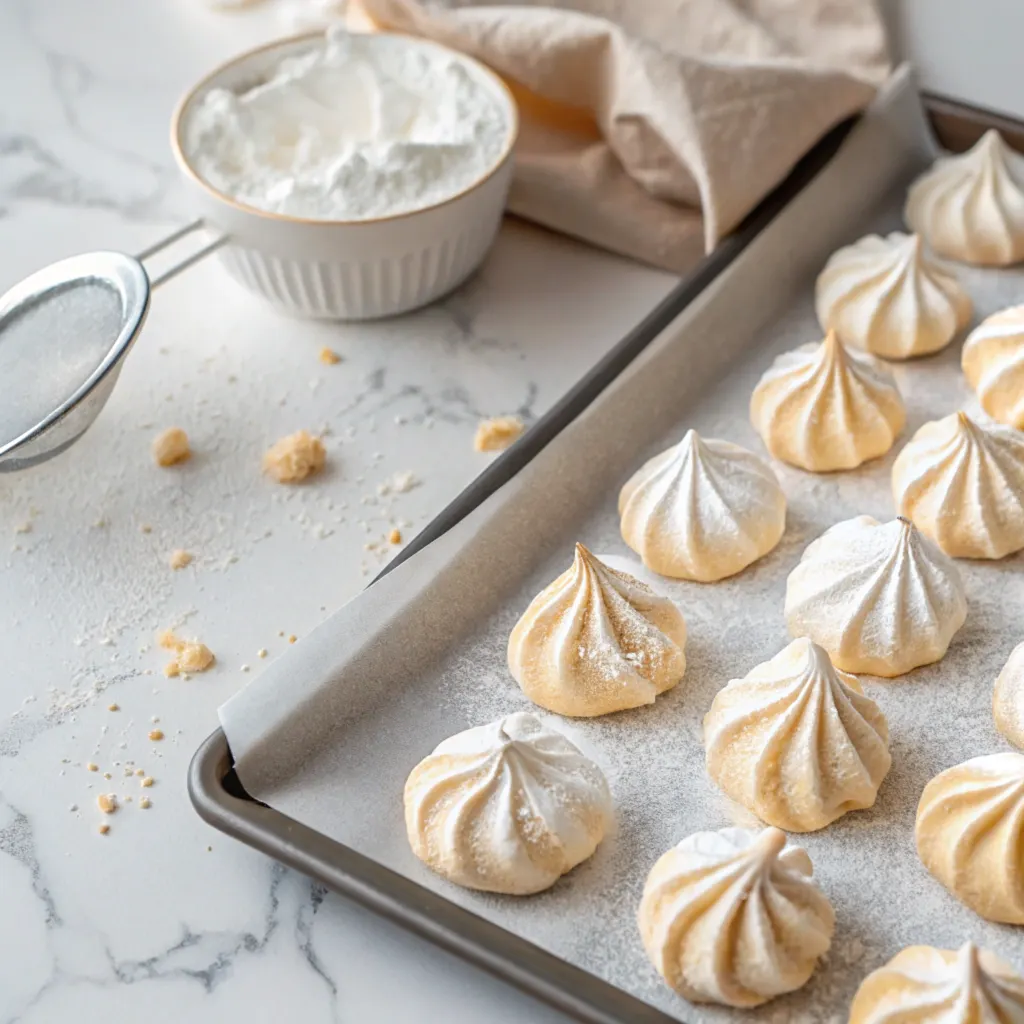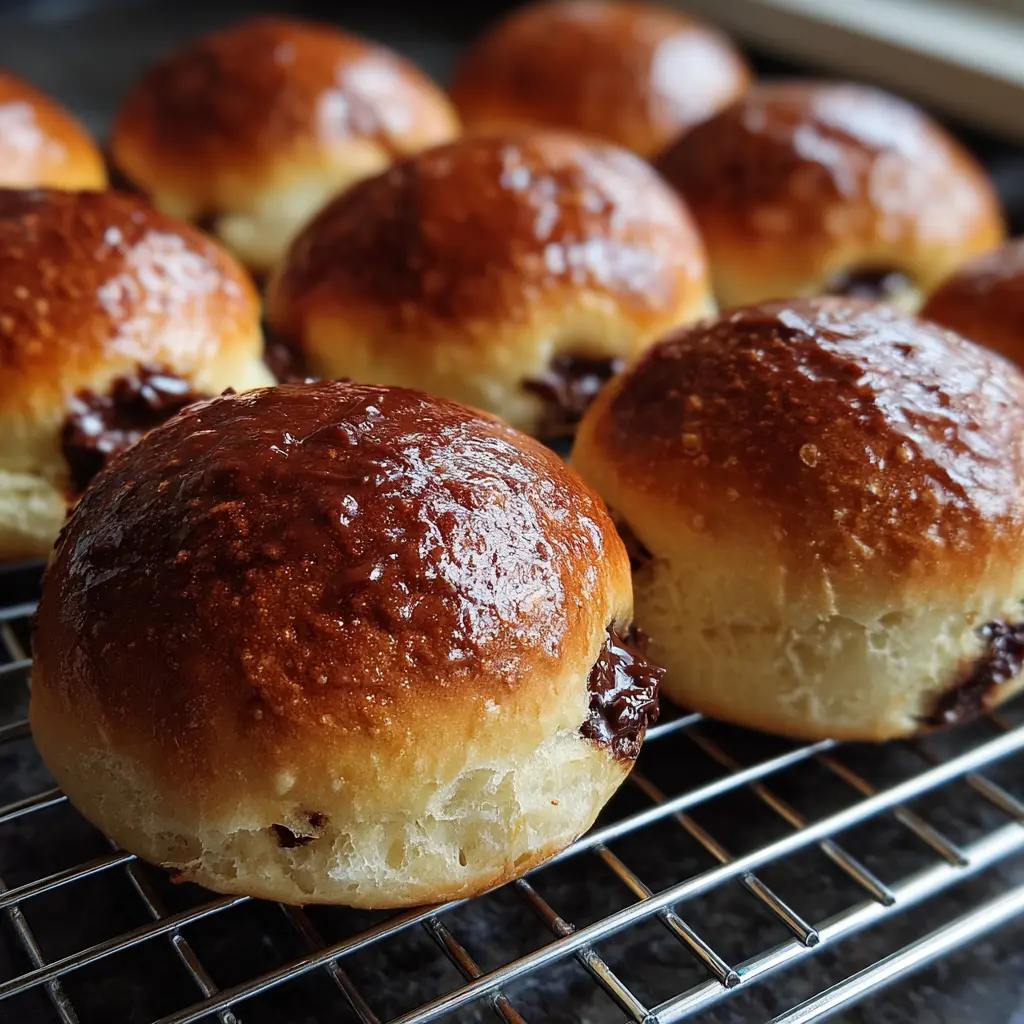When it comes to making the perfect meringue cookies, crispness is key. But do meringue cookies harden as they cool? Yes, these delicate treats will, if you follow the right techniques. Many home bakers find themselves puzzled when their cookies remain soft or sticky even after cooling. From the science of sugar and egg whites to the crucial factors affecting texture, this article will guide you through all the steps needed to achieve perfectly crisp meringue cookies.
We’ll also cover common pitfalls, baking tips, and frequently asked questions so you can confidently whip up these sweet treats. Ready to learn how meringues behave and how to avoid baking mishaps? Let’s dive in!
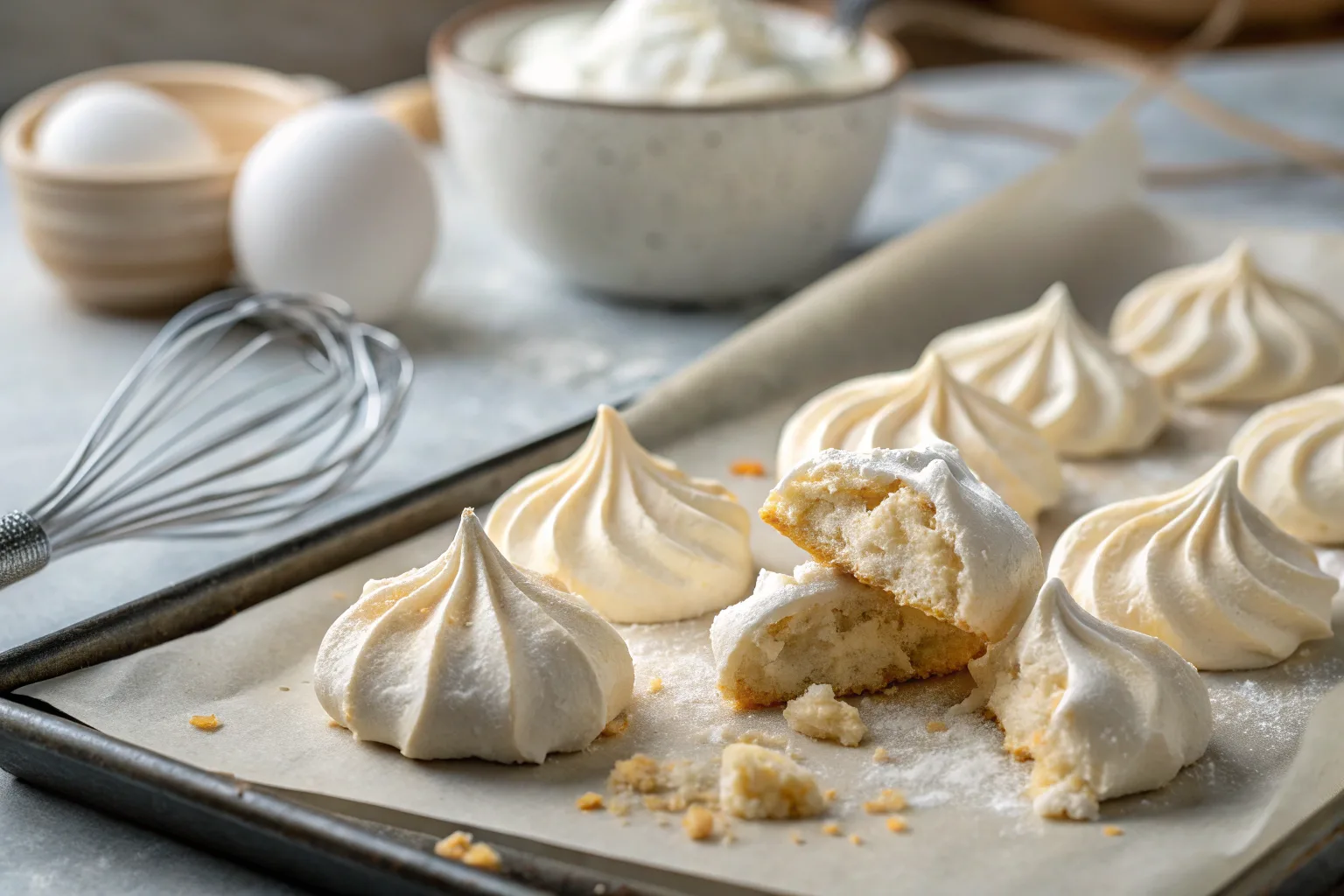
Perfect Meringue Cookies
Ingredients
Equipment
Method
- Preheat the Oven: Set oven to 225°F (110°C) and line a baking sheet with parchment paper.
- Whip the Egg Whites: In a clean, grease-free mixing bowl, beat egg whites and salt on medium speed until foamy.
- Stabilize the Mixture: Add cream of tartar and continue beating.
- Gradually Add Sugar: While beating on medium-high speed, slowly add sugar one tablespoon at a time until glossy stiff peaks form.
- Add Flavoring: Gently fold in vanilla extract (and any other flavorings or add-ins).
- Pipe the Meringue: Transfer the meringue mixture to a piping bag with a star tip or spoon dollops onto the lined baking sheet.
- Bake Slowly: Bake for 1½ to 2 hours or until the meringues feel dry and firm to the touch.
- Cool Gradually: Turn off the oven and let the meringues cool inside with the door slightly open for at least 1 hour to harden properly.
- Serve or Store: Enjoy immediately or store in an airtight container to maintain crispness.
Nutrition
Notes
For best results: Make meringues on a dry, low-humidity day to prevent stickiness.
Storage Tips: Keep in an airtight container at room temperature for up to 2 weeks.
Reheating to crisp up: If they soften, bake at 200°F (95°C) for 15-20 minutes.
Tried this recipe?
Let us know how it was!The Science Behind Meringue Cookies
What Makes Meringue Cookies Harden as They Cool?
Meringue cookies are a delightful balance of simplicity and precision. Made from just egg whites and sugar, these airy treats rely on a fascinating combination of chemistry and technique. When you whip egg whites, you introduce air, creating foam. The proteins in the egg whites trap these air bubbles, giving meringues their signature light and fluffy texture.
The Role of Sugar in Meringue Texture
Sugar isn’t just for sweetness—it plays a critical role in structure. As you gradually add sugar to beaten egg whites, it dissolves and stabilizes the foam. The sugar binds with the water in the egg whites, making the meringue less prone to collapse. A good sugar-to-egg white ratio, like 3 parts sugar to 1 part egg white, yields a sturdy foam that will bake into a crisp meringue.
Interestingly, sugar is hygroscopic, meaning it absorbs moisture from the air. This is why meringues can sometimes become sticky in humid conditions. Understanding such properties is crucial in baking, as highlighted by food science research from institutions like Purdue University. The right balance of sugar and proper drying during baking can help you achieve the perfect texture.
How Sugar and Egg Whites Affect Meringue Hardening
Egg whites are the backbone of meringue cookies. When whisked, the proteins in egg whites unravel and bond around air bubbles. This creates a stable foam that expands during baking. However, the structure is delicate—any fat or residue can break the foam. That’s why using a clean bowl and whisk is vital.
To get the best results, whip egg whites to stiff peaks, where the foam stands up firmly without collapsing. Achieving this stage sets the foundation for a cookie that will become crisp as it cools.
Factors That Affect Meringue Cookie Crispness
Baking Time and Temperature for Crispy Meringue Cookies
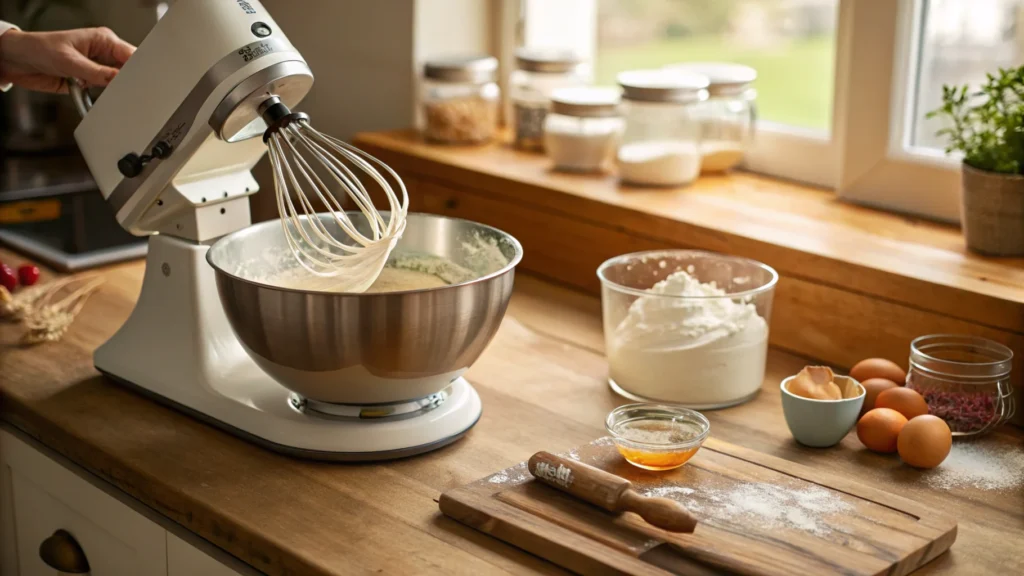
Getting meringue cookies to harden correctly depends largely on baking time and temperature. Low and slow is the name of the game. Baking at temperatures between 200°F and 250°F dries the meringues without browning them. Too high, and they’ll brown before drying out; too low, and they may stay soft.
How long should you bake them? Typically, an hour to an hour and a half works for smaller cookies. After baking, turning off the oven and letting them cool inside helps avoid sudden temperature changes. This gentle cooling process helps answer the question of whether meringues will harden as they cool. Yes, when the moisture evaporates fully.
Humidity and Its Impact on Meringue Cookie Firmness
Humidity can be a meringue’s worst enemy. Because sugar absorbs moisture, baking on a humid day can leave your meringues sticky or soft. Even if they’re baked perfectly, high humidity can prevent them from hardening properly during cooling.
If possible, bake on dry days or use a dehumidifier in your kitchen. Alternatively, let the meringues cool in the oven with the door slightly ajar. This keeps moist air out while allowing the cookies to dry thoroughly.
Cooling Process and Its Importance
Cooling is just as critical as baking. After the oven time is up, turning off the heat and leaving the meringues inside with the door cracked helps them firm up. Pulling them out too soon can expose them to moisture in the air, making them sticky or chewy.
Once they’re completely cool, transfer them to an airtight container right away. This prevents humidity from undoing all your hard work. So, if you’re wondering about how these cookies achieve their final crispness as they cool, remember: proper cooling is the final step in getting that satisfying crunch.
Why Meringue Cookies Might Stay Soft
Common Reasons Meringue Cookies Stay Soft
One of the main reasons meringue cookies stay soft is underbaking. If they don’t spend enough time in the oven, they won’t dry out completely. They may look done on the outside but still contain moisture inside. That trapped moisture prevents them from hardening as they cool.
If your meringues feel sticky or chewy, bake them a little longer. It’s better to over-dry them slightly than to pull them out too early. When in doubt, bake for another 15 to 20 minutes and let them cool in the oven.
Proper Cooling Methods to Help Meringue Cookies Harden
Even if baked correctly, meringues can stay soft if moisture gets trapped during cooling. For instance, closing the oven door completely after baking can trap steam, making the cookies sticky. Instead, leave the door slightly open to let steam escape.
Also, avoid letting them sit out in a humid room. As soon as they’re cool, transfer them to a dry, airtight container. This keeps moisture out and helps them stay crisp.
Common Mistakes in Preparation
Several common mistakes can lead to soft meringues. First, make sure your mixing bowl and beaters are free of grease. Any fat can ruin the structure of your egg whites. Second, always add sugar gradually. Dumping it in all at once can prevent the sugar from dissolving properly.
Finally, don’t rush the whipping process. Beating the egg whites to stiff peaks creates the strong foam needed for a crisp cookie. Soft peaks won’t give the same results. If you’ve tried everything and still wonder why your meringues aren’t firming up as they cool, double-check your technique. A little attention to detail goes a long way in perfecting meringues.
How to Ensure Your Meringue Cookies Harden Properly
Proper Baking Techniques for Crisp Meringue Cookies
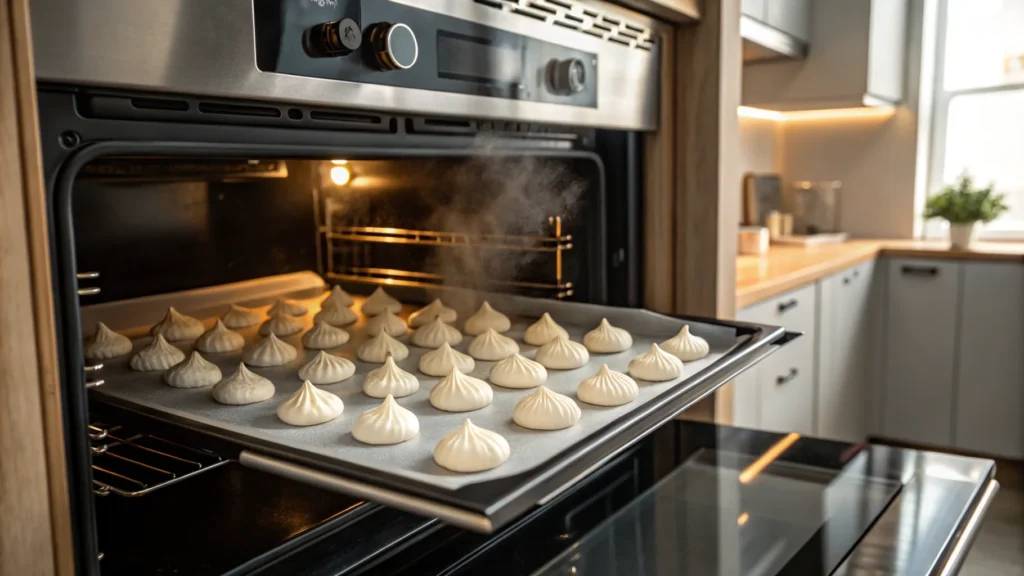
Perfectly hardened meringue cookies start with the right baking techniques. Always bake them at a low temperature—between 200°F and 250°F. This slow process helps the moisture evaporate evenly without browning the meringues. Smaller cookies typically need around an hour, while larger ones may need up to two hours.
Timing is crucial, but don’t rely solely on the clock. Check that the meringues look dry and lift easily from the baking sheet. If they still feel sticky, give them another 15 minutes. This extra drying time can make all the difference in getting them to firm up correctly.
For step-by-step guidance on making lemon-flavored meringues, you might enjoy this lemon meringue cookie recipe.
Tips for Drying Meringues Completely
To avoid sticky meringues, let them dry fully in the oven after baking. Turn off the oven and leave the door slightly open. This allows the meringues to cool gradually and prevents moisture from sneaking back in.
If you’re in a hurry, resist the urge to take them out immediately. Patience pays off when it comes to drying meringues. Letting them cool for at least an hour inside the oven ensures they firm up nicely.
Once they’re completely cool, store them in an airtight container. This step is essential to prevent humidity from softening them. If you live in a humid area, consider adding a small packet of silica gel to absorb excess moisture.
Proper Cooling Methods for Crisp Cookies
So, do meringue cookies harden as they cool? Absolutely—but only if the cooling process is correct. After baking, let them rest in the oven with the heat off and the door slightly open. This prevents sudden temperature changes, which can cause cracking or softening.
Once they’re at room temperature, move them straight to a sealed container. Avoid leaving them out too long, especially on humid days. A good seal locks in the crispness and keeps moisture out.
Does the Type of Meringue Affect How Cookies Crisp Up?
Differences Between French, Swiss, and Italian Meringue
Yes, the type of meringue you use can affect their crispness as they cool. There are three main types: French, Swiss, and Italian meringue. Each one has its quirks and best uses.
French meringue is the most common for cookies. It’s made by whipping sugar into egg whites until stiff peaks form. This type bakes into a light, crisp texture that sets perfectly if dried well.
Swiss meringue involves heating the sugar and egg whites over a water bath before whipping. It results in a denser, smoother texture. While it’s often used for buttercream or toppings, it can also be baked into cookies.
Italian meringue is the most stable but also the trickiest. It uses a hot sugar syrup, making it dense and glossy. While great for toppings or frostings, it’s not the best for achieving crisp cookies.
Which Meringue is Best for Crisp Cookies?
If you’re aiming for cookies that harden nicely, French meringue is your best bet. Its simplicity makes it easy to whip up, and it dries out perfectly during baking. Follow the tips for baking and cooling, and you’ll get crisp, light cookies every time. For more baking inspiration, check out how to make lemon meringue cookies. This recipe walks you through the process step-by-step and offers tips for achieving that satisfying crunch.
Frequently Asked Questions About Meringue Cookie Hardening
Why Don’t My Meringue Cookies Harden Properly?
Sticky meringue cookies are usually the result of trapped moisture. Baking on a humid day or not drying them long enough can cause this issue. Since sugar attracts moisture, even a little humidity can make meringues turn sticky. To avoid this, bake the cookies on a dry day, let them cool in the oven with the door slightly open, and store them in an airtight container immediately after cooling.
How Long Should Meringues Cool?
Cooling meringue cookies properly is just as important as baking them. Once they’re done baking, turn off the oven and leave the door slightly ajar. Let the cookies sit inside for at least an hour or until they reach room temperature. This gradual cooling process helps answer the question, “Do meringue cookies harden as they cool?” Yes, if they are dried and cooled slowly.
Can You Fix Soft Meringue Cookies?
Yes, you can! If your cookies turn out soft, pop them back into the oven at 200°F for another 15-30 minutes. Let them cool in the oven again with the door ajar. This extra drying time can firm them up. Just be careful not to brown them.
Storing and Serving Meringue Cookies
Best Ways to Store Meringue Cookies

After spending time perfecting your meringue cookies, the last thing you want is for them to go soft. Proper storage is crucial to maintaining their crispness. As soon as they’ve completely cooled, place them in an airtight container. Adding a layer of parchment paper between the cookies can help prevent them from sticking together.
If you live in a humid area, consider including a silica gel packet in the container. This will help absorb any extra moisture. Meringue cookies can last up to two weeks when stored properly, a practice essential for food preservation, as emphasized by guidelines from the USDA. Wondering if these cookies will truly become crisp after baking? They will, but only if you protect them from humidity afterward.
Serving Suggestions for Meringue Cookies
Meringue cookies are delightful on their own, but they can also be part of a larger dessert spread. Serve them with a side of fresh berries for a light, refreshing treat. They also pair well with a cup of hot coffee or tea.
For a more indulgent twist, try dipping the bottoms in melted chocolate or drizzling chocolate over the top. You can also crumble them over ice cream or yogurt for extra crunch. If you’re hosting a party, meringue cookies make an elegant addition to dessert platters. Their delicate texture and sweet flavor are sure to impress guests. For more baking ideas, you might enjoy our recipe for lemon meringue cookies. Happy baking and serving!

Conclusion: Perfecting the Art of Crisp Meringue Cookies
So, do meringue cookies harden as they cool? Absolutely—but the process relies on careful baking, proper drying, and smart cooling techniques. To ensure your meringues achieve that satisfying texture every time, here are 7 key tips for success:
- Bake Low and Slow (200°F-250°F): This gentle heat ensures the meringues dry out completely without browning prematurely.
- Control Kitchen Humidity: Whenever possible, bake on a dry day or use a dehumidifier, as sugar is hygroscopic and attracts moisture.
- Cool Gradually in the Oven: After baking, turn off the oven and leave the door slightly ajar. This prevents sudden temperature changes and allows for thorough drying.
- Avoid Underbaking: If they still feel sticky, return them to a low oven for another 15-30 minutes; trapped moisture is the enemy of crispness.
- Ensure Grease-Free Equipment & Gentle Mixing: Any fat can destabilize egg whites, and overmixing can lead to a tough, dense texture.
- Whip to Stiff Peaks & Add Sugar Gradually: Achieving firm, glossy peaks is fundamental for a stable structure, and slow sugar addition ensures it dissolves properly.
- Store Immediately in Airtight Containers: As soon as your meringues are completely cool, transfer them to a sealed container to protect them from ambient humidity.
By understanding the science behind egg whites, sugar, and humidity, and by following these practical tips, you can achieve meringues with that perfect crispness.
Baking meringue cookies may seem tricky at first, but with practice and patience, you’ll master the process. These light, airy treats are worth the effort and will delight friends and family with their delicate texture.
Now it’s time to put your skills to the test! Whip up a batch, experiment with flavors, and enjoy these delightful treats. Happy baking!

